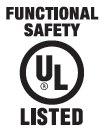When manufacturers deliver products with certification of their functional safety, they demonstrate that they treat safety as one of the most important requirements during the development and production of their devices and appliances, and that they actively seek to minimise risks.
UL (Underwriters Laboratories Inc.), a globally independent company that is dedicated to the study and improvement of safety, has been evaluating products for use in safety-critical applications since the 1990s. Since 2010, UL has offered certification of functional safety with marking in the form of the ‘UL Functional Safety Mark’.
During the certification tests for functional safety, UL evaluates compliance with all the norms and standards applicable to a given product, with regard to the reliability and effectiveness of technical safety systems. As part of this process, all safety-related control systems and the safety software of the test object are taken into consideration. The evaluation process also includes an evaluation of software, hardware, environmental factors and the processes that are in place with a view to functional safety throughout the product life cycle.
Accordingly, the ‘UL Functional Safety Mark’ is not just a statement about the product. It is also a statement about the maturity level of the device or appliance manufacturer. With the UL test mark on a product, the manufacturer attests to its ongoing commitment to compliance with the applicable standards.
Besides typical applications in which functional safety requirements are expected, e.g. power station control systems, the supply of electrical power to operating theatres or railway uses, the growing importance of photovoltaic power stations for power supply at a national level also increases the significance of functional safety for applications of this kind.
A faulty or failed insulation monitoring device can cause a huge photovoltaic power station to slip unnoticed into a critical operating condition. Experience shows that starting a central inverter on an existing double earth fault causes irreparable damage to the central inverter, which in turn leads to the failure of the entire photovoltaic power station. The greater the contribution of large PV arrays to the total supply of electrical power in a region, the more critical any spontaneous failure of those arrays inevitably becomes.
Any cost savings realised by operating unreliable insulation monitoring devices can then become very expensive.
The Bender isoPV1685 series insulation monitoring devices for unearthed DC systems of up to 1500 V in photovoltaic installations have been awarded a Functional Safety Test Mark by UL. This certifies that these devices meet the requirements both for purposes of the UL Listed Test Mark and with regard to functional safety.
Bender GmbH & Co. KG
Londorfer Str. 65
35305 Grünberg
Telefon: +49 (6401) 807-0
Telefax: +49 (6401) 807-259
http://www.bender.de
Kommunikation
Telefon: +49 (6401) 807-521
E-Mail: marita.schwarz@bender.de
![]()
